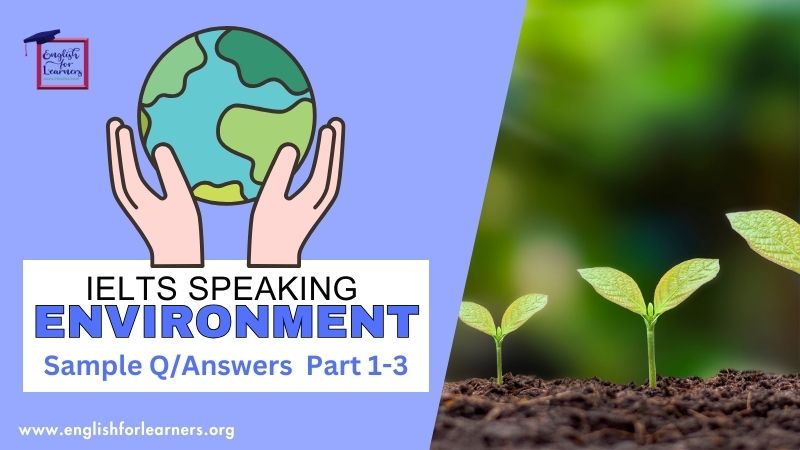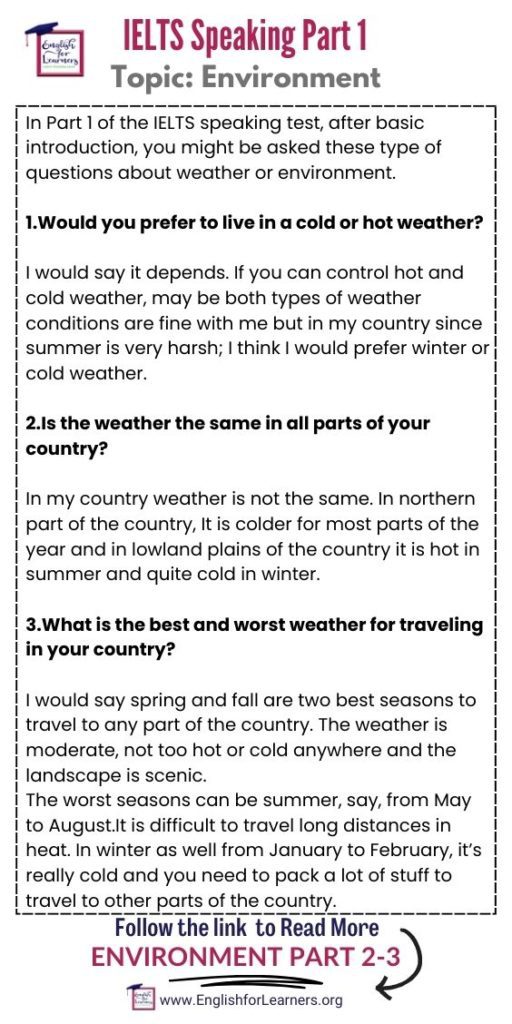
Environment is a popular discussion question in IELTS Speaking. In Part 1 usually there might be some common question about environment, pollution and recycling sort of topics. But they are usually general questions you can answer from your own personal observation or experience.
We will discuss all question types related to IELTS questions about Environment. Let’s take a look at part 1. In part 1 of the IELTS Speaking Test, you will be asked simple questions to settle you down for a more complex conversation on specific topics.
Table of Contents
Environment IELTS Speaking Part 1
In Part 1 of the IELTS speaking test, after basic introduction, you might be asked these type of questions about weather or environment.
1.Would you prefer to live in a cold or hot weather?
Sample Answer
I would say it depends. If you can control hot and cold weather, may be both types of weather conditions are fine with me but in my country since summer is very harsh; I think I would prefer winter or cold weather.
2.Is the weather the same in all parts of your country?
Sample Answer
In my country weather is not the same. In northern part of the country, It is colder for most parts of the year and in lowland plains of the country it is hot in summer and quite cold in winter.
3.What is the best and worst weather for traveling in your country?
Sample Answer
I would say spring and fall are two best seasons to travel to any part of the country. The weather is moderate, not too hot or cold anywhere and the landscape is scenic.
The worst seasons can be summer, say, from May to August.It is difficult to travel long distances in heat. In winter as well from January to February, it’s really cold and you need to pack a lot of stuff to travel to other parts of the country.
Pin this image.

Environment IELTS Speaking Part 2 Cue Card
Describe an Environmental Problem that was in the News
You should say:
- What the environmental problem is…
- When and where it has been in the news.
- Why this environmental issue is significant.
- What measures have been taken or suggested to address this problem.
Sample Answer
Well, the environmental problem I want to talk about is global warming. It’s all over the news because it’s a big issue that affects the Earth’s climate. People are talking about it a lot these days. The problem is that human activities, like burning fossil fuels, release gases that trap heat in the atmosphere, making the planet warmer.
You can see news about global warming almost every day, especially during big climate conferences or when there are extreme weather events like heatwaves, floods, or storms. It’s a global issue, so it’s in the news everywhere.
This problem is really significant because it messes up the weather and can cause serious problems. Ice is melting in the polar regions, and that makes sea levels rise, which can flood coastal areas. It also messes with nature, making it hard for animals and plants to survive in their usual habitats.
To tackle global warming, countries are trying to work together. They signed agreements like the Paris Agreement to reduce the gases that cause the problem. People are also looking at using more clean energy, like solar and wind power, instead of things that make pollution. The idea is to make everyone aware of the problem and to find ways to live in a way that doesn’t make global warming worse.
It’s a big challenge, but the more we talk about it and find ways to fix it, the better chance we have of keeping our planet safe.
More IELTS Speaking Cue Cards on Environment
Environment IELTS Speaking Test Part 3 Disussion
Part 3 of IELTS Speaking test is a continuation of topics discussed in Cue card questions. Lets’s take a look at some more in depth questions about environment and their sample answers.
1.What can individuals do to protect the environment?
Sample Answer
Well, there are several things that individuals can do to protect the environment. One simple step is to reduce the use of single-use items. For example, instead of using plastic water bottles, people can carry a reusable water bottle. Also, using cloth bags instead of plastic ones when shopping can help cut down on waste.
Another thing is to be mindful of energy consumption. Turning off lights and electronic devices when not needed and using energy-efficient appliances can make a difference. It’s a small change, but it adds up over time.
Water conservation is also essential. Simple actions like fixing leaking faucets and using water wisely, such as turning off the tap while brushing teeth, can contribute to saving water.
And of course, recycling is crucial. Separating recyclables from regular waste and making sure items like paper, plastic, and glass get recycled properly helps reduce the overall environmental impact.
2.Do you think it is the responsibility of governments alone to protect the environment?
Sample Answer
Well, I don’t think it’s only the government’s job to protect the environment. Individuals can also make a difference. For instance, by not littering and recycling, we can reduce waste. People can also use energy wisely, like turning off lights when not needed. If everyone does their part, it adds up and helps keep the environment healthy. So, it’s a shared responsibility between individuals and the government.
3.What are the main environmental problems in your country?
Sample Answer
In my country, one big environmental issue is air pollution. This happens a lot in cities because of cars and factories. Also, deforestation is a problem – cutting down too many trees affects the balance of nature. And there’s water pollution too, especially in some rivers where industries release harmful chemicals. These problems harm the environment and people’s health.
4.Do you believe climate change is a serious problem?
Sample Answer
Yes, I absolutely believe that climate change is a serious problem. We can see its impact through more frequent and intense heatwaves, like the ones we’ve experienced recently. Also, the melting of polar ice caps, such as in Antarctica, is contributing to rising sea levels, posing a threat to coastal areas. These changes not only affect the environment but also disrupt ecosystems, endangering wildlife. It’s crucial for us to recognize the severity of the issue and take collective actions to address it.


